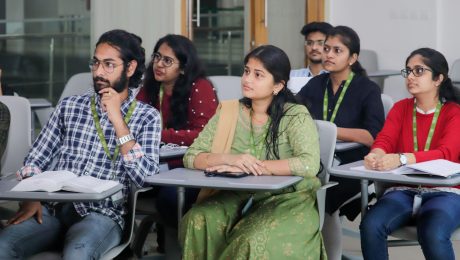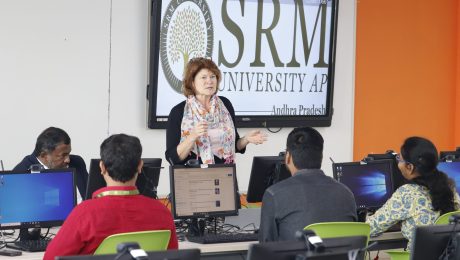How SRM AP students are getting industry-ready
Motivation is what gets you started; MBA is what gets you going. It’s a phrase management aspirants have heard many times over. Your management programme is not just a course to imbibe crucial business skills; it’s a stepping stone for a long-term, successful corporate career. It should be seen as the vital stage in your journey towards your goals, which prepares you for the fast-evolving business scenarios today and in the future as well.
World economies have been in a state of flux, the job market has always been intensely competitive; today it’s also riddled with uncertainty. It’s your training and experiences during your management programme that will set you apart from other candidates for dynamic career profiles. School of Entrepreneurship And Management Studies (SEAMS) at SRM University-AP is driven by the goal of nurturing leaders of tomorrow with its futureproof programmes.
The new entity carves out its identity
SRM University-AP brought to the state the legacy of the SRM brand renowned for its excellence in the fields of engineering, science, medicine, social science, commerce, law, and management education. In a short span of time, it raised the bar for higher education in India making its mark on the global stage. Meanwhile, SEAMS carved out its own identity within the University becoming a force to reckon with thanks to its future-forward management programmes.
- Strong Foundation: The cutting edge, industry-oriented curriculum of the programmes is designed to help students understand the inside outs of the business world in areas of Finance, HR, Marketing, Leadership, Entrepreneurship and Management. These skills hold students in good stead in their long term careers.
- Innovative pedagogies and assessment: Case studies, group discussions, role-plays, quizzes, research projects have been integrated into the programmes to promote active learning. Along with digital exams and online tests, they are also part of the assessment process that helps determine students’ progress.
- Mentorship from the best in the business: Given its reputation, SEAMS has attracted a strong faculty pool that includes industry-experienced names. Through various industry interaction sessions, workshops and seminars also bring students in close contact with professionals who can mentor them.
- Industry exposure: Students of the university engage in research projects guided by their faculty members and transform into problem solvers. They also get vital real-world exposure through live projects and internships with top corporate companies, to be groomed into industry-ready professionals and leaders.
- Multidisciplinary way ahead: Business leaders who can think laterally and out of the box, are the need of the future. Lateral thinking is just one of the many benefits students experience as they study in the multidisciplinary environment at the University. Peer learning through interactions with students from diverse backgrounds is enriching.
- Going global: Business managers and leaders from the country have the potential and platform to make their presence felt on the global stage. The university has endeavoured to facilitate that with its international collaborations with top organizations. Its partnership with Harvard Business School Online is one of many such initiatives.
Future beckons Indian business professionals. With its futureproof management programmes, SRM University-AP is ensuring that its socially-conscious managers, leaders and entrepreneurs are ready for it.
Innovation in education
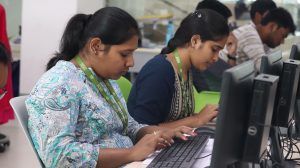
“Innovation is the only way to win,” said Steve Jobs, who certainly knew a thing or two about innovations. With Industry 4.0 and digital disruptions felt across every sector, innovation and creativity are the way forward. Institutions of higher learning that are focused on nurturing winners in varied walks of life have integrated innovation into their modes of learning, curriculum and ecosystem. And SRM University-AP has been leading the way.
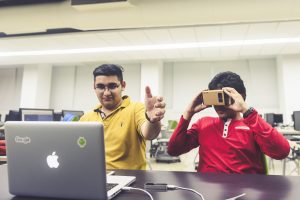 Established as a broad-based multidisciplinary research-intensive university, it has been the flagbearer for innovation in a short span of time. Of course, the unprecedented events of the past year necessitated the integration of innovation into modes of learning and classroom delivery. SRM University-AP was up to the challenge, swiftly transitioning to digital platforms, encouraging engaging pedagogies and novel assessment systems to enhance students’ learning experience.
Established as a broad-based multidisciplinary research-intensive university, it has been the flagbearer for innovation in a short span of time. Of course, the unprecedented events of the past year necessitated the integration of innovation into modes of learning and classroom delivery. SRM University-AP was up to the challenge, swiftly transitioning to digital platforms, encouraging engaging pedagogies and novel assessment systems to enhance students’ learning experience.

But the university’s truly pioneering work lies in fostering an entrepreneurial and innovation-centric aptitude amongst students. Through mentorship from faculty members and industry experts, SRM University-AP has consistently strived to inculcate the values and penchant for innovation and creative solutions amongst students. It has also instated varied clubs and initiatives that promote students pursuits based on innovation.
- The Innovation Cell at the university promotes the active participation of students in numerous activities that put innovative thinking into focus. From participation in events like Toycathon 2021 to Smart Idea contests, it is a buzzing hub of activity.
- ENNOVAB, the Entrepreneurial Innovation Lab is a student-run centre that has added a rich layer to the ecosystem at the university. It was founded by alumni of the Saturdja Center For Entrepreneurship & Technology, University of California Berkeley.
- It will also partner with SRM University-AP and Jacob Center of Design And Innovation to launch the Innovation, Design and Entrepreneurship Academy (IDEA). It will harness the culture for students of liberal arts and sciences, engineering and management.
- SRM Habitat for Research & Innovation in Science (SHRISTI) takes things a step further and has been designed to nourish young and fragile businesses through guidance and resources. It will enable students to develop their business ideas effectively.
- The university is also keen on establishing Centers of Excellence on Cloud Computing, Internet of Things (IoT), Artificial Intelligence and Machine Learning, 5G Technologies, Weather Forecast, Satellite Technology, Renewable Energy etc.
SRM University-AP has been organising seminars and conferences that speak for the values of innovation in every industry sector. Together with these centers and labs, it has thus created an environment where students can ideate, innovate, be creative, and become the changemakers of tomorrow.
- Published in Blog, Innovation
Strengthening Research Culture
“In much of society, research means to investigate something you do not know or understand. Research is creating new knowledge,” said Neil Armstrong, the first man on the moon. The quest for knowledge creation has consistently pushed researchers and scholars to seek answers to evolving questions. And if there is anything we have learned in the past year, it’s that we are often posed with new challenges that require innovative solutions in today’s world.
The new world has its eyes trained on well-trained researchers, who are problem solvers of tomorrow. Their journey begins at institutions of higher learning, which should not only imbibe research aptitude but also equip them with cutting edge skills to see their projects to logical conclusions. Looking at teaching and research as independent entities can be a considerable loss, and new-age institutions like SRM University-AP are set on avoiding it at any cost.
Research in its DNA
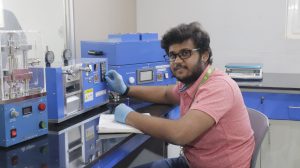 Since its inception, SRM University-AP has been known as a broad-based multidisciplinary research-intensive university. As its Pro-Vice-Chancellor Prof. D. Narayana Rao says, “SRM University-AP provides exciting and challenging research opportunities that are of national and international importance and have social applications.” True to those words, it has developed a lively ecosystem conducive to research, showing the results.
Since its inception, SRM University-AP has been known as a broad-based multidisciplinary research-intensive university. As its Pro-Vice-Chancellor Prof. D. Narayana Rao says, “SRM University-AP provides exciting and challenging research opportunities that are of national and international importance and have social applications.” True to those words, it has developed a lively ecosystem conducive to research, showing the results.
The research focus at the University had drawn around 60 scholars from around the world pursuing their PhDs in their areas of interest. In a short span of time, faculty members and students of the University have published over 200 research papers. In 2019-20 alone, eight patents were published, and 5 were applied for under SRM University-AP. The staggering amount of quality output has caught the eye of aspiring researchers and leading institutions alike.
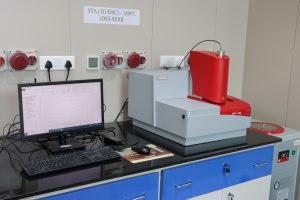
Top names like DST, DBT, BRNS, Government of India and the British Council have sanctioned 24 research projects with a total outlay of Rs. 12.00 crores to faculty members at SRM University-AP. And this seems only the beginning for scholars at the University, who are encouraged by concerted initiatives and growing infrastructure on campus, which has a thriving ecosystem for research pursuits.
- The University has drawn a dynamic pool of faculty members with international exposure. As they work on impactful research, they mentor students and scholars to think creatively and present solutions through projects.
- It is set to create Centres of Excellence on Cloud Computing, Internet of Things (IoT), Artificial Intelligence and Machine Learning, 5G Technologies, Weather Forecast, Satellite Technology, Renewable Energy, Energy Storage Devices, Additive Manufacturing, Gene Editing, and Blue Economy to embrace new technologies.
- Its international collaborations with MIT, the University of California, Berkeley and other renowned foreign universities offer students opportunities to interact with and collaborate with peers and academicians worldwide.
- SRM University-AP has also focused on industry collaborations with powerhouses like TITAN, Amara Raja Batteries Limited (ARBL) for joint research. In fact, it is working with Indian Railways to develop hydrogen-powered fuel cell-based trains.
These and other projects in the pipeline can no doubt have an impact on society. But at the same time, shaping future knowledge creators and problem solvers will be a significant achievement stemming from the research culture on the SRM University-AP campus.
Developing New Age Professionals
“Education is not the learning of facts but the training of the mind to think.” Albert Einstein
Your college years are when you learn the foundational concepts and get exposure to industry functioning through practical experiences. But in most instances, it’s also the last stage in your training before you put on the professional gloves. You are gearing up for long and successful innings in your career, and you want to start it on a solid footing. That’s why focusing on extracurricular activities during your programmes remains crucial.
The industry today is looking for a lot more from its employees than ever before. New age industry professionals need to be equipped with lateral thinking skills to arrive at solutions from diverse perspectives. They choose candidates with leadership qualities, teamwork, professionals who can think critically and out of the box. These are just some of the attributes seen in students who emphasize extracurricular activities as much as academic excellence.
New age higher learning institutions like SRM University-AP are leading the way by bridging the gap between industry demands and students’ skills set. Our programmes are designed to promote the holistic growth of students through varied extracurricular activities. Students can opt for activities that are in keeping with their interests and hone their skills. They complement your academic learning and transform you into the well-groomed professionals of tomorrow.
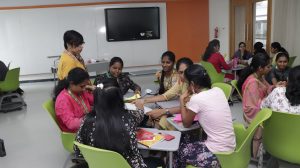 The Department of Student Affairs at SRM University-AP works closely with students, faculty members and staff to create a thriving ecosystem for holistic growth. Students are exposed to enriching experiences that boost their skills and interests through numerous clubs and societies. They also find platforms to showcase their talent and gain confidence while also learning leadership skills as they organize these events and take ownership.
The Department of Student Affairs at SRM University-AP works closely with students, faculty members and staff to create a thriving ecosystem for holistic growth. Students are exposed to enriching experiences that boost their skills and interests through numerous clubs and societies. They also find platforms to showcase their talent and gain confidence while also learning leadership skills as they organize these events and take ownership.
- Art and Culture oriented clubs focused on photography, music, dance etc., engage students in artistic pursuits. They also hone creative thinking skills, which are a tremendous value addition to the repertoire of future professionals.
- The activities of movie clubs, literary clubs are designed to engage students in discussions that offer them a broader perspective. They boost lateral thinking and offer students exposure to diverse backgrounds, cultures and more.
- Students can also participate in various sporting activities on campus. Sports Clubs not only emphasize all-around fitness but also build team spirit and leadership abilities. They boost students’ confidence to perform on bigger stages.
- SRM University-AP endeavours to shape socially conscious and responsible future professionals. Through yoga and meditation, activities of the Welfare Club, students understand the importance of leading fulfilling lives while giving back to society.
- Extracurricular activities can include everything from app development to imbibing entrepreneurship skills through specifically designed clubs. These activities build on the skills learned in the classroom and offer valuable exposure.
All extracurricular activities enhance student engagement on campus, build their organizational skills, boost confidence and transform them into leaders. These are essential skills for new age professionals, so the role of extracurricular activities in their nurturing is indispensable.
SRMJEEE 2024 : Complete and Latest Information
BTech – SRMJEEE Application 2024
If you are here, then the chances are that you already know that SRMJEEE 2024 is the Joint Engineering Entrance Examination held by the SRM Institute of Science and Technology. Appearing for SRMJEEE 2024 is a very convenient method to get into one of the finest research institutes in any part of the country.
Through SRMJEEE 2024, you can become a part of SRM University-AP. Innovation and research at SRM University-AP are multidisciplinary and cutting-edge. You can be a part of one of the most advanced classrooms, learn from exclusive field experts from India and abroad, even take up a semester abroad yourself, and much more.
Are you interested in applying? You are just one simple click away from the smoothest application procedure.
Application for Admissions 2024 is Opened!.
Want to know more? Don’t worry. We will walk you through the entire process. This is as simple as it gets.
Table of Contents
- SRMJEEE 2024 Important Dates
- SRMJEEE 2024 Admission Process
- SRMJEEE 2024 Examination Question Pattern
- SRMJEEE 2024 Syllabus
- SRMJEEE 2024 Eligibility
- SRMJEEE 2024 Application Process
1. SRMJEEE 2024 Important Dates:
The dates for the two-phase examination procedure of SRMJEEE 2024 have been released.
| Entrance Exams for Engineering Programs (SRMJEEE): | |||
| Number of SRMJEEE Phases – 2 | Timeline of SRMJEEE Phases | ||
| Phase 1* | Phase 2* | ||
| SRMJEEE ( Remote Proctored Online mode ) | 20 April 2024 , 21st April 2024, 22nd April 2024 | June 10th 2024, June 11th 2024 | |
| Application Deadline for Each Phase | 13th April 2024 | 15th June2024 | |
SRMJEEE 2024 Phase-1 Instructions
2. SRMJEEE 2024 Admission Process:

3. SRMJEEE 2024 Examination Question Pattern:
- Each question carries one mark. There are NO negative marks. You are encouraged to attempt every question.
- The mode of examination will be online.
- The question paper type will be MCQs or Multiple Choice Questions only.
- The question paper will be in English ONLY.
- Physics- 35 questions
- Chemistry- 35 questions
- Mathematics/Biology- 40 questions
- Aptitude- 10 questions
- English- 5 questions
- Total number of questions- 125
- Total time: 2.30 hrs
| SRMJEEE Sample Papers | Download Link |
| SRMJEEE Question Papers 2023 | Download Here |
| SRMJEEE Question Papers 2022 | Download Here |
| SRMJEEE Question Papers 2019 | Download Here |
| SRMJEEE Question Papers 2018 | Download Here |
| SRMJEEE Question Papers 2017 | Download Here |
| SRMJEEE Question Papers 2015 | Download Here |
4. SRMJEEE 2024 Syllabus:
5. SRMJEEE 2024 Eligibility:
A. Nationality and Age
- Resident Indian or Non-Resident Indian (NRI), holder of PIO or OCI card issued by the Government of India are eligible to apply for SRMJEEE (UG).
Note: NRIs, holders of PIO or OCI card issued by the Government of India who has not taken the SRMJEEE (UG), must apply under the international student category only. - Students should have attained the age of 16 years and 6 months on the 31st of July of the calendar year in which the 12th Board examination is to be held.
B. Eligibility to apply for the Qualifying Examination:
- A minimum aggregate score of 60% or equivalent grade point in Class X.
- Passed with Minimum 60% aggregate or equivalent grade in Physics, Mathematics, and Chemistry/ Computer Science/ Information Technology/ Informatics Practices/ Engineering Graphics in 12th Standard/Higher secondary examination (10+2 pattern ) /Intermediate (first and second year) or appearing in 12th Standard/Higher Secondary examination(10+2 pattern)/Intermediate in the current academic year with Physics and Mathematics as compulsory subjects along with any one of the subjects, Chemistry/ Computer Science/ Information Technology/ Informatics Practices/ Engineering Graphics as major subjects in regular stream from any state board within India, CBSE, ISCE, Matriculation, or NIOS are eligible to apply. However, admission is confirmed based on meeting the minimum 60% aggregate or equivalent grade in Physics, Mathematics, and Chemistry/ Computer Science/ Information Technology/ Informatics Practices/ Engineering Graphics in 12th Standard/Higher secondary examination (10+2 pattern) /Intermediate (first and second year).
- GCE A-Level: Minimum C grade in Physics and Mathematics and Chemistry/ Computer Science/ Information Technology/ Informatics Practices/ Engineering Graphics. Physics and Mathematics should be compulsory subjects along with one of the Chemistry/ Computer Science/ Information Technology/ Informatics Practices/ Engineering Graphics as major subjects (equivalent to Advanced Placement level in each subject) in any international schools within India.
- International Baccalaureate (IB) diploma or IB certificate: Minimum 4 points each in Physics and Mathematics and Chemistry/ Computer Science/ Information Technology/ Informatics Practices/ Engineering Graphics.
- 2 subjects in HL (equivalent to Advanced Placement level or Honors) and 1 subject in SL is mandatory.
| Programme | HL | SL/HL |
|---|---|---|
| All BTech Programmes | Maths | Physics and Chemistry / Computer Science/ Information Technology/ Informatics Practices/ Engineering Graphics |
Note:
- If Computer Science/ Information Technology/ Informatics Practices are considered for eligibility, then the candidate will be eligible only for BTech CSE and specialisations in Computer Science.
- For all other programmes (ECE, EEE, Mechanical Engineering, and Civil Engineering), Chemistry will be taken for eligibility.
- Students who have completed +2/Intermediate/equivalent under NIOS must have completed the 10th standard/equivalent from regular schooling or vice-versa.
- For the Board of Intermediate Education (Andhra Pradesh) Average of first and second-year marks is considered.
C. Criteria for Admission
Indian students
- Admission will be based on meeting the eligibility conditions listed in Section A and Section B and the performance in the qualifying examination i.e., SRM JEEE / SRMAPET.
- The decision of the admission committee will be final and binding.
D. Admission Instructions
- BTech programmes listed on the website are indicative only. SRM University-AP reserves the right to add and delete programmes and amend the list depending on the viability of offering the same.
- The admission will be purely on the basis of the performance in the SRMJEEE (UG)/SRMAPET entrance examination conducted by SRM University-AP. Being called for the entrance test and enrolment does not necessarily mean accepting eligibility. It is the responsibility of the candidates to ascertain whether they possess the requisite eligibility for admission.
- Eligibility criteria such as the minimum percentage of marks in PCM or CGPA obtained by the candidate in the qualifying examination and minimum percentage in the 10th standard shall be as prescribed by the SRM University-AP from time to time.
Note: The aggregate percentage of marks obtained in the 10th Standard/ PCM in 12th Standard/Intermediate/equivalent should be calculated up to 3 decimal points and not be rounded off to the nearest integer. - Academic tuition fees, hostel fees, mode of payment, and refund policies will be available on the university website.
- The admission offered to a candidate who has been provisionally admitted to a programme will stand cancelled if he/she does not submit the relevant documents pertaining to admission (such as Marks Statements, Transfer Certificate, Conduct Certificate, etc.) in their original during enrolment before the date stipulated by the university.
- Even after admission, the university reserves all rights to cancel the candidate’s admission in case, any discrepancy is noticed on verification of facts from the original certificates/documents. The decision shall be final and binding on the candidate. The university cannot be held responsible for any loss or damage arising from such cancellations of admissions.
- Accommodation in SRM University-AP hostels will be subject to availability. The allocation will only be done after the tuition fee payment and enrolment procedure are completed.
- All disputes are subject to the jurisdiction of the courts only at Vijayawada.
- Refund Policy: Candidates are requested to visit the SRM University-AP website for the detailed refund policy, timeline and eligibility percentage of tuition fee.
- Published in Admissions, Blog
SRMJEEE 2023 : Complete and Latest Information
B.Tech – SRMJEEE Application 2024
If you are here, then the chances are that you already know that SRMJEEE 2024 is the Joint Engineering Entrance Examination held by the SRM Institute of Science and Technology. Appearing for SRMJEEE 2024 is a very convenient method to get into one of the finest research institutes in any part of the country.
Through SRMJEEE 2024, you can become a part of SRM University-AP. Innovation and research at SRM University-AP are multidisciplinary and cutting-edge. You can be a part of one of the most advanced classrooms, learn from exclusive field experts from India and abroad, even take up a semester abroad yourself, and much more.
Are you interested in applying? You are just one simple click away from the smoothest application procedure.
Application for Admissions 2024 is Opened!.
Want to know more? Don’t worry. We will walk you through the entire process. This is as simple as it gets.
Table of Contents
- SRMJEEE 2024 Important Dates
- SRMJEEE 2024 Admission Process
- SRMJEEE 2024 Examination Question Pattern
- SRMJEEE 2024 Syllabus
- SRMJEEE 2024 Eligibility
- SRMJEEE 2024 Application Process
2. SRMJEEE 2024 Admission Process:

3. SRMJEEE 2024 Examination Question Pattern:
- Each question carries one mark. There are NO negative marks. You are encouraged to attempt every question.
- The mode of examination will be online.
- The question paper type will be MCQs or Multiple Choice Questions only.
- The question paper will be in English ONLY.
- Physics- 35 questions
- Chemistry- 35 questions
- Mathematics/Biology- 40 questions
- Aptitude- 10 questions
- English- 5 questions
- Total number of questions- 125
- Total time: 2.30 hrs
| SRMJEEE Sample Papers | Download Link |
| SRMJEEE Question Papers 2023 | Download Here |
| SRMJEEE Question Papers 2022 | Download Here |
| SRMJEEE Question Papers 2019 | Download Here |
| SRMJEEE Question Papers 2018 | Download Here |
| SRMJEEE Question Papers 2017 | Download Here |
| SRMJEEE Question Papers 2015 | Download Here |
4. SRMJEEE 2024 Syllabus:
5. SRMJEEE 2024 Eligibility:
A. Nationality and Age
Resident or Non-Resident Indian (NRI), holder of PIO or OCI card issued by Government of India are eligible to apply for the SRMJEEE 2024 selection process.
Note: NRIs, holders of PIO or OCI card issued by the Government of India, must apply under the International student category only.
Should have attained the age of 16 + on the 31st July of the Calendar year in which the 12 Board or Qualifying examination is to be held.
B. Eligibility to apply for the Qualifying Examination:
A Minimum aggregate score of 60 % or equivalent grade point in Class X.
A minimum aggregate score of 60% or equivalent grade point in Physics, Chemistry, and Mathematics in Higher Secondary Examination (10+2) / Intermediate (First and Second year) or from any Indian education boards recognised by the Board of Higher Secondary Education, Delhi (CBSE, CISCE, and State Education Boards recognised by Board of Higher Secondary Education) (https://www.bhsedelhiboard.net/List-of-recognised-board-in-India), International Baccalaureate (IB) diploma or IB certificate ( https://www.ibo.org/ ) or University of Cambridge General Certificate of Education (GCE) A-level with Physics, Chemistry, and Mathematics as compulsory subjects. (https://www.cambridgeinternational.org/ )
Students appearing for their Class/Standard XII final board examinations in the current academic year are also eligible to apply for SRMJEEE 2024. However, admission is confirmed based on meeting the minimum aggregate score of 60% or equivalent grade in Physics, Chemistry, and Mathematics.
C. Criteria for Admission
Admission will be based on meeting the eligibility conditions listed in Section A and Section B and the performance in the qualifying examination, i.e., SRMJEEE / SRMAPET.
The decision of the admission committee will be final and binding.
- Published in Admissions, Blog
Journey of Dr Manjula R towards Privacy in Wireless Sensor Networks
Anecdote:
“Since my school days, I have been fascinated by writing cryptic text, though intelligible. It all started with mirror-writing the teaching-feedback that was requested by our class teacher Tr. Jezuine. Once the feedback was read, the teacher called me and asked: “How did you learn this?” I was on cloud nine and replied, “it just happened only for you”, with a massive smile on my face. Later, I never thought of any secret writing for a while. It was only during the initial days of my teaching profession; I had the opportunity to read my classmate’s notes scribbled in a cryptic text which triggered further enthusiasm in me. So, during my postgraduate course, I started reading and presenting seminars on Cryptography and Security. This further led to deeper digging into the core of security aspects that also led to a trivial postgraduate project on key-establishment in wireless sensor networks. Later during the research period, I chose a new upcoming area – wireless sensor networks (broader domain), and contextual- and content- privacy (narrower domain) – privacy preservation in WSNs as my research topic.”
-Dr Manjula R
The Issue:
The significance: The privacy of individuals is being compromised gradually with the increasing popularity and rapid deployment of pervasive computing technologies. The benefits and conveniences offered by modern devices often lead people to neglect the dire consequences of possible privacy violations. Therefore, privacy risks should be taken into considerations while designing responsible technologies. One such technology that poses serious privacy risks is the Wireless Sensor Networks (WSNs). Despite the enormous benefits offered by WSNs to humanity, several issues need meticulous attention. Security and privacy are such issues in WSNs. For instance, the US military aims to adopt Internet of Things (IoT) enabled WSN. The usage of WSNs, Unmanned Aerial Vehicles (UAVs), tiny robots (nanoscale robots) are envisioned to transform the battlefield scenario. In particular, these digital devices and components are embedded in soldiers’ uniforms to collect the health status of the worriers and relay this information to a central controller, named the base station (BS). The BS is located near places where the internet is easily accessible. Nevertheless, WSNs are deployed in areas where it is challenging to have internet. However, this problem is easily solved with the amalgamation of WSNs and IoT. This comes with unwelcoming consequences. The unattended nature of these networks provides an attacker with physical access to the devices. The attacker may compromise the node and conduct illegal activities, say, mimic fake chemical leakages etc. Furthermore, the broadcast nature of the transmission medium gives access to the packets exchanged by the sensor nodes to anyone within the communication range. Consequently, adversaries may exploit these features of WSNs in order to launch attacks against the network and thus render all the potential benefits offered by this technology unusable. Hence, privacy preservation in WSNs is a significant issue that needs to be addressed to safeguard personal and private assets—soldiers or endangered animals etc.
In a quest to provide countermeasures to such attacks, Dr Manjula R and her team are developing privacy preserved solutions with particular emphasis on routing in WSNs. Their recent research article titled “Protecting Source Location Privacy in IoT Enabled Wireless Sensor Networks: The Case of Multiple Assets” has been accepted for publication in a peer-reviewed journal – IEEE Internet of Things Journals. This work is co-authored by Prof. Raja Datta, IIT Kharagpur and Mr Tejodbhav Koduru (studying in 5th semester in dept. of CSE, SRM University AP). The SCI-indexed journal has an impact factor of 9. 396. The team is also focusing on the development of new countermeasures to mitigate eavesdropping attacks in WSNs.



Career options after Mechanical Engineering
You have landed the coveted seat as a Mechanical Engineering student. Congratulations! What is your next goal? What career options after Mechanical Engineering are you considering? You will be happy to know that mechanical engineers have a much wider career field to choose from than many other engineering disciplines.
Introduction to Mechanical Engineering Field:
The best part of engineering, any discipline of engineering, is to be able to engineer things. As a mechanical engineer, you would become familiar with fundamental aspects of many other disciplines. Mechanical Engineering is a seminal discipline of engineering from which many other branches (automobile engineering, aerospace engineering, etc.) have developed.
Mechanical Engineering formally emerged as a discipline in the 18th century during the Industrial Revolution. However, for all intents and purposes, Leonardo DaVinci would have been a mechanical engineer if he was living today. In fact, the origin of Mechanical Engineering can be traced to the invention of simple machines such as wheels, levers, wedges, or ramps.
But where are the Mechanical Engineers today? What is in store for them in the future?
Simple. Everything as far as the eye can see. Career options for Mechanical Engineers range from joint design in a robot prototype to fluid dynamics measurement in the human body. Mechanical Engineers play a critical part in the development of any machine that we see around us.
SRM University-AP’s multidisciplinary courses widen the scope of Mechanical Engineering careers. The option to pick minors from a variety of fields gives mechanical engineers the scope to enhance and diversify their domain knowledge.
Responsibilities of Mechanical Engineers in their Jobs:
Mechanical Engineers are typically involved in the creation of the mechanical aspects of the design. They can work on theoretical aspects such as research or conceptualisation or more functional aspects such as design and design development.
In any workspace, the role of the mechanical engineers revolves around the following:
- Identification of the problem and researching on how it can be resolved mechanically.
- Designing a solution theoretically as well as virtually.
- Creating a prototype and testing the prototype stability over various parameters.
- Overseeing the manufacturing process and providing guidelines on maintenance.
Popular Industries and Sectors for Career Options in Mechanical Engineering:
- Manufacturing
Mechanical Engineers can always find good career opportunities in the manufacturing sector. The intuitive manner in which they approach a complication often comes in handy not only in engineering roles but also in management roles. Mechanical engineers are good at mapping out the structure and identifying the root of issues, making them valuable assets for any manufacturing company.
- Armed Forces and Defence
The Defence sector needs to strive for higher efficiency. There are few sectors as lucrative and competitive as the armed force ones. Mechanical Engineers play a vital role in this area, from competitor assessment to model development. Constant up-gradation and quick solutions are defining features of any person looking for a job in this sector.
- Aerospace Industries
Working for the aerospace industry is the dream of many engineers. The opportunities for mechanical engineers in this sector are plenty. As our aerospace technologies develop to accommodate our exploration aspirations, the need for mechanical engineers rises to design the best models possible.
- Automobile Industries
Faster than light. Though the automobile industry is yet to achieve this dream, it has remained their vision. Mechanical engineers are the most in-demand people in this sector to turn this dream into reality and make it safer while doing so. So, if you love cars and making them talk to the wind, you might want to look into this sector for job opportunities.
- Construction
The construction sector heavily relies on inputs from Civil engineers. However, mechanical engineers would find that they play a vital role in this industry as well. As the terrains for construction differ, the demand for the insight and consultation of mechanical engineers to create fail-safe designs heightens.
- Energy Services
Energy generation and storage are heavily reliant on mechanical engineers to design and implement technology with green sources and less loss. The research and development scopes and the design prospects in this sector are fertile and constantly in demand of greater and greater efficiency.
- Biomedical
Most of the human body systems need to be read by tools designed by Mechanical engineers. Not just that, these engineers are the ones who devise the methods to make these tools minimally invasive as well. The biomedical sector recognises the need for mechanical engineers to improvise their systems and economise their tools.
- Robotics and Automation
Perhaps the most awesome-to-the-ears field, the field of robotics and automation, needs mechanical engineers to design the most flexible and durable apparatus. Mechanical engineers face extraordinary problems and requirements in this field and strive to provide equally jaw-dropping solutions to it.
Job Positions after Mechanical Engineering
- Mining Engineer
- Water Engineer
- Aerospace Engineer
- Mechanical Engineer
- Automotive Engineer
- Maintenance Engineer
- CAD Technician
- Nuclear Engineer
- Control and Instrumentation Engineer
Tips for Mechanical Engineers to Improve Career Prospects
- Technological Proficiency
Stay up to date with the latest software platforms. It is crucial in this day and age to learn how to navigate the digital space even when most of your work might be on-site. Moreover, this would also show that you are a person who is always prepared to adapt to the new and more convenient technology.
- Experience
Having hands-on experience is crucial in any industry to facilitate hiring decisions. However, it is even more critical if you are a mechanical engineer. Do not wait till your graduation. It is advisable for most engineers to look for experience through internships. A good internship can make your CV stand out among your peers.
- Higher Education
Do not stop at a graduate degree if you wish to climb up career ladders. It would help if you levelled up. Get higher education. Show that you are willing to make an effort on yourself to do your job better.
- Additional Certifications
Having additional certifications that add value to you professionally can make you a real catch real fast. It can be surprisingly beneficial if you have a multidisciplinary education. You will be able to provide value to organisations requiring a mechanical engineer but do not belong to the traditional sectors.
- Interpersonal Skills
It is crucial to curate the soft skills and interpersonal skills needed to market yourself to the hiring manager properly. Your rigorously developed domain knowledge will be for nought if you fail to present them to the concerned people in the proper manner. Moreover, strong interpersonal skills will help you network well and connect with the right people, affecting your growth prospects exponentially.
- Management Degree
If you wish to climb the corporate ladder, then it would be advisable to obtain a management degree to go with your graduate degree. A management degree can be your gateway to coveted executive positions. Perks aside, your inputs could be the deciding factors for your organisation’s growth and stability.
SRM University-AP trains the students and prepares them, at the outset, for their dream jobs and their career expectations. The practical learning approach to education prepares the students to face several challenges in their professional domain before even entering the workforce. Each student’s needs and career goals are kept in consideration while advising them about the minors that would be helpful to them, training them with necessary skills, and even providing them with essential exposure.
Studying with SRM University-AP will help you broaden your career options after Mechanical Engineering. Find out more about the Undergraduate Programme in Mechanical Engineering offered by SRM University-AP here.
Startup incubated by BBA student crosses ₹1 crore turnover
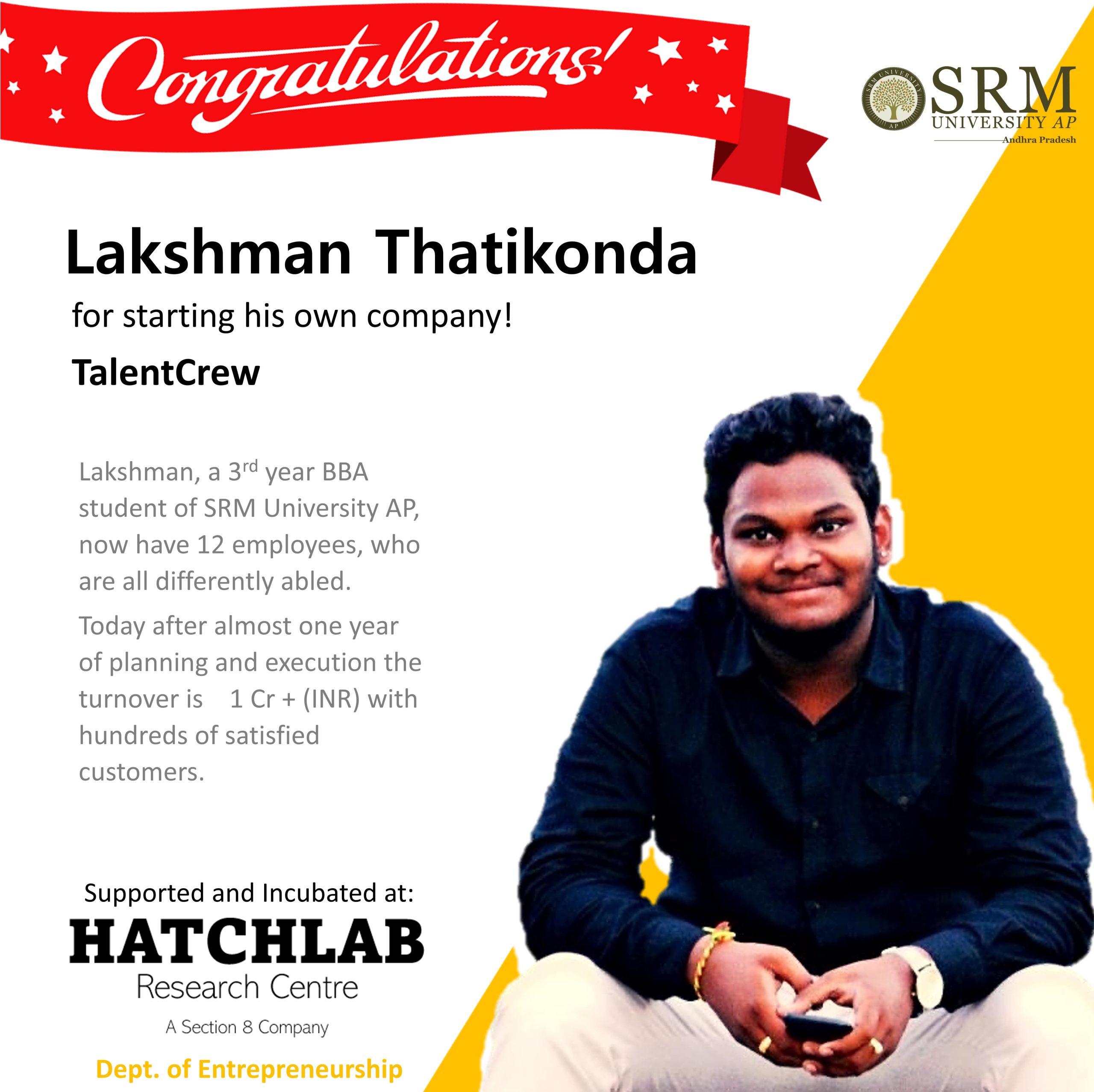 Mr Lakshman Thatikonda, a 3rd year BBA student of SRM University-AP, has started his own business venture (TalentCrew), incubated at the Hatchlab Research Centre– The technology and livelihood business incubator of SRM University-AP.
Mr Lakshman Thatikonda, a 3rd year BBA student of SRM University-AP, has started his own business venture (TalentCrew), incubated at the Hatchlab Research Centre– The technology and livelihood business incubator of SRM University-AP.
The talent crew is a skill-based startup. They are one of India’s largest multi-category customised gifting companies, providing one of the best-curated collections of festival merchandise, gifts, handicrafts, wedding cards, carvings & personalised products for all occasions & festivals. TalentCrew has a global footprint with customers spanning 20 plus countries and the capability to deliver gifts to over 50 countries and 300 plus cities in India. Mr Lakshman started this organisation on the principles of creativity, agility, and social responsibility.
Over the next few years, TalentCrew envisions exploring and developing new products and services that will actively expand business while touching social responsibility.
Experience at Hatchlab Research Centre
The Hatchlab research centre aims to support SRM E-Cell’s mission of developing entrepreneurial talent and fostering the commercialisation of new ideas ventures. “Working with Hatchlab research centre was always a great experience. Here I found the fresh start for the innovation, and here the programme is very well structured with the right blend of practice,” says Mr Lakshman. “The best thing about this programme is that it allows me to learn while still being employed. And I always feel thankful for Dr Lakshmana Rao sir, for motivating me on every stand that I take, and Udayan Bakshi sir, for giving me such a wonderful opportunity” he added.
- Published in Blog, IDEA NEWS, Innovation, News, Paari Current Happenings, Students Achievements
Scope for ECE Students
Electronics and Communications Engineering or ECE is a very popular educational choice for the prospective engineering students. ECE students can have careers in industries like consumer electronics manufacturing organization, Automotive, Telecommunication & IT industries, Health care equipment manufacturing, Mobile communication (2G, 3G, and 4G), Internet technologies, Power Electronics, and other industries like steel, petroleum, and chemical industry etc.
ECE students also have lots of opportunities in Government and private companies in the areas of design, manufacture, installation, operation, and maintenance of electronics equipment and systems. New opportunities and avenues are also opening for electronics & communication engineers due to the integration of electronics into various new industrial verticals.
The latest technologies include self-driving cars, autonomous drone logistics, robotics, automation in industries, smart energy systems etc. But getting acquainted with these industries will not be easy. They demand engineers who have more hands-on experience with the latest technologies.
Electronics students with skills in robotics, automation technologies, renewable energies, Internet of Things (IoT), mechatronics engineering concepts add more value to their average pay scale. Students pursuing electronics engineering aim to get a highly paid job, so improving their skill sets will impact their pay scale a lot.
Major technologies in which an ECE engineer can work on:
- Analog and Radio Frequency Circuits: Without these cell phones, Wi-Fi, television will cease to exist. A lot of industries are established to meet consumer demands, and, in the process, they opened a lot of job opportunities for electronics engineers.
- Communication & Signal Processing: This technology particularly finds its application in the transmission, storage, and analysis of information signals.
- Computer & Digital Systems: All the industries are able to advance technologically at a faster pace than before with the help of computers. These digital systems are everywhere from smartwatches to Mars rovers.
- Networking: With the boom on the internet, we are experiencing 3G, 4G services that help organizations and industries to easily collaborate with people. There is a lot of scope for engineers who want to work in this technology.
- Computer vision & Image processing: These technologies are helping computers in the areas like medical, surveying, photogrammetry etc. For instance, now we have medical devices that can analyse data to not only display images but identify diseases too with the help of magneto-resonance imaging technology
- Control systems & Robotics: With the advancement in technologies lately more and more industries are adopting automation and robots into their operations to improve their efficiency. And a lot more industries are expected to adopt these technologies in the coming years.
- Remote Sensing: Communication via radio waves is essential for mobile devices, radios, and all the devices that are connected to the internet. From mapping to navigation, remote sensing plays a vital role in various technologies.
- Nanotechnology: The more efficient solar cells, faster transistors, tracking chips and microscopic sensors that we see today are the products of nanotechnology. A lot of industries are adopting this technology to make their products smaller and more efficient.
- Sustainable Energy & Power systems: Now industries are investing lots of their money and time to develop more efficient solar cells, windmills, systems that can generate power from tides etc. This technology offers a wide range of job opportunities for electronics engineers.
- Energy Storage Technology: The demand for energy storage systems is likely to grow exponentially globally as the world shifts towards renewable energy sources. This shift will mandate both grid level and unit level energy storage systems that are of viable size, cost, and energy efficiency. Significant research is currently being conducted on materials, engineering, and other optimisations.
Skills that an ECE student needs to develop to improve job prospects:
If you are an ECE student, here are some of the skills and areas that you need to concentrate on to improve your job prospects:
- Computer proficiency is a must these days; try to get acquainted with some of the industrial-grade software.
- Develop your communication and interpersonal skills
- Develop more practical skills and get hands-on experience on theoretical concepts
- Get exposed to current industrial methodologies as much as possible
- Stay updated with the latest technologies by developing projects on them
- Do additional certified training programs to build your profile
- Take additional responsibilities in your college to showcase your managerial skills
- Develop your leadership and team working abilities
ECE at SRMAP:
Studying ECE at SRMAP offers students the unique opportunity to gain experiences, skills and knowledge which will set them apart from their peers.
- Semester Abroad Programme: For those who strive to learn cutting edge practices from reputed Universities abroad, SRMAP offers a dream-come-true opportunity to the selected students to obtain necessary skills and insights which will make them shine among their competitors.
- Centres of Excellence: The centres of excellence will nurture the potential in students by giving them a working environment and allowing them to test their mettle.
- Multidisciplinary curriculum: The curriculum at SRMAP is fluid. It draws upon traditional courses with a modern and practical outlook. However, the most prominent feature of the curriculum at SRMAP is that it transcends convention, focuses on recent trends in research and technology. and provides the students with the essential tools wot take the forefront positions in their field.
- Placements: Placements at SRMAP are extremely motivated by the individual’s needs and career aspirations. The students are given relevant advice since day one and often train to acquire skills as per their strengths and ambitions. This makes them the suitable candidate for their dream job with exciting offers in their hands.


